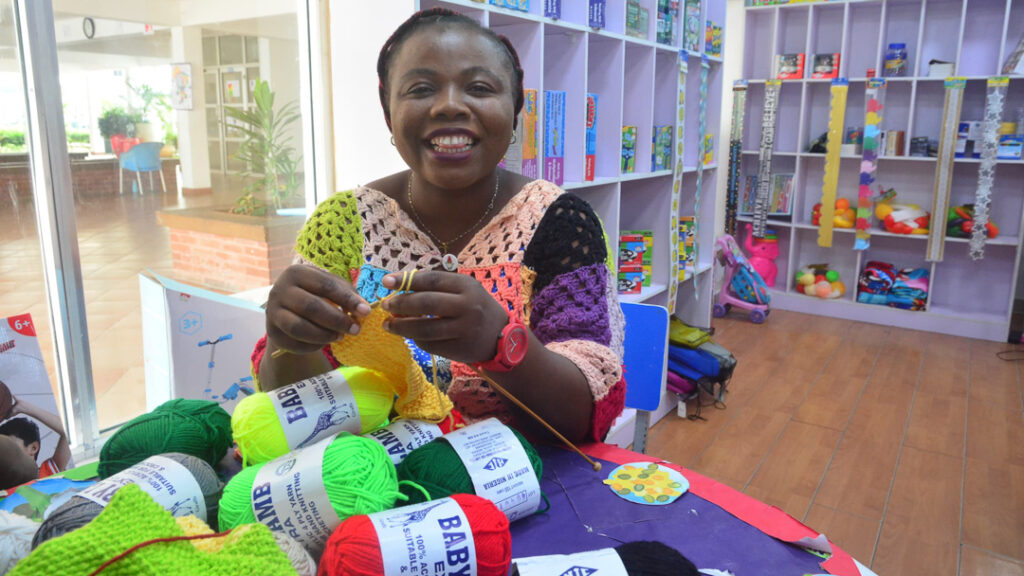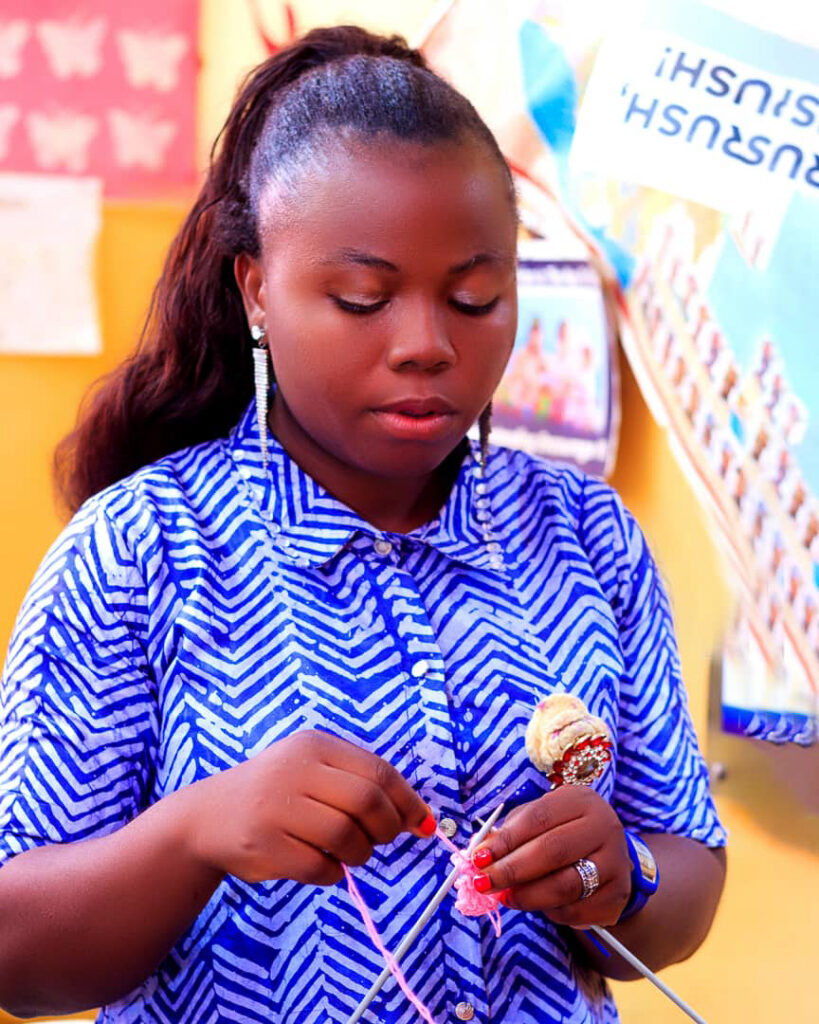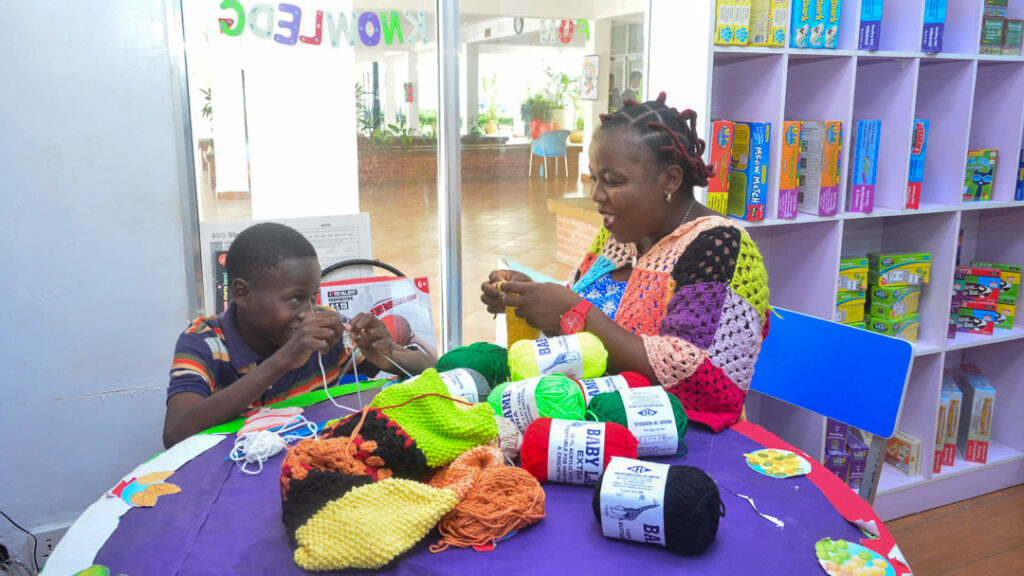
Elizabeth Okeyele-Olatunji shares her passion for teaching African children knitting and crochet for their economic welfare and creative pleasure.
If we want craft skills to outlive generations! We must put them in the hands of children!
I was recently invited by a yarn company in Nigeria to attend their customer appreciation week at a local craft shop. Inspired, I suggested setting up a “Learn to Knit” stand next to their yarn section. The idea of standing beside an array of vibrant yarns, demonstrating the possibilities to children, fills me with excitement.
Back in 2016, I approached this same yarn factory and offered to consult for free. At the time, local yarns for knitting and crochet were only produced in thin, size 2 strands, with ball bands improperly labelled, which limited public interest in knitting, and most craft supplies were imported. Although they sometimes dismissed my suggestions, I never gave up. I envisioned how larger, colourful yarns readily available in the local market could captivate children, sparking curiosity and creativity. I also saw yarn as a powerful educational tool for kids—an idea that initially seemed far-fetched to the factory, whose primary market was for thin yarn used in knitting machines and hair braiding. The factory director would often ask, “But how many people will buy this yarn?”
Fast forward to 2022: after persistent effort, I brought in a sample of size 5 yarn and requested they produce it for me. With some convincing, the spinning manager finally agreed to make a single ball. When I received the sample, I was thrilled with its look and feel—especially after recommending they soften it. The factory then decided to produce more, and by 2023, we saw a significant distribution of these larger, vibrant yarns across Nigeria. In partnership with the factory, we are even expanding distribution to Cameroon and surrounding regions.
Now, this store where I’ll be attending the customer appreciation event has beautiful displays of these yarns in a variety of colors! I can’t express the joy I feel when young learners sign up for my classes, holding these very yarns in their hands. It’s fulfilling to know that my ideas have come to life—and that I could even approach the yarn factory for royalties!
As a knitting teacher in Lagos, Nigeria, my work is immensely rewarding. Since 2012, I’ve had the privilege of teaching over 5,000 children to knit. Following my mini MBA, I aspired to create a knitting app for children, only to realise there was almost no data on children’s knitting across Africa. Children are learning informally all over the continent, but there’s so much potential to create formalized resources and bring the joy of knitting to even more young people. Who should do this immense work? I set the goal to reach 20,000 African children with the skill of knitting and crochet by 2030.

Africa is the world’s second-largest and second-most-populous continent after Asia. Africa Contains 54 fully recognised sovereign states, eight cities and islands that are part of non-African states, and two de facto independent states with limited or no recognition. This count does not include Malta and Sicily, which are geologically part of the African continent. Algeria is Africa’s largest country by area, and Nigeria is its largest by population. African nations cooperate through the establishment of the African Union, which is headquartered in Addis Ababa.
How can a knitting teacher in Lagos, with a huge dream reach a population of 1,393,676,444 as of 2021? The strategy is to start with what I have, Right where I am. So in 2023, I decided to partner with eshe yarns in Nairobi, we worked with 11 volunteers across some children’s homes and reached Kenyan children. Eshe Yarns has continued to campaign to get more children in Kenya to knit and crochet. The volunteers are also charged to keep the work going!
My passion for reaching children with knitting crochet stems from my childhood love of working with yarns. I learnt how to knit at age 7 with broomsticks. My classmates taught me. I never learnt to cast off because we had no teacher to teach knitting right. That became my motivation to teach children to knit right!
My first book, Knitting ABC 22 Patterns for the Young to Explore has been revised twice, first in 2018 and 2020, it’s on the shelf in some bookshops across Lagos and some states in Nigeria. I have written articles in craft magazines and knitting websites in the UK, US, Canada Nigeria and beyond. I am co-authoring knitting books for children and others who may want to pass on knitting skills to young people in schools and beyond!
Passion is always a starting point! But it is never enough! I keep advocating for yarns and craft supplies makers to take up the mantle and make supplies targeted at young people! We call them the next generation! They are the future of crafting!
My next stop is Cameroon. I am in talks with local volunteers, children’s homes and craft supplies to reach children when I visit to teach. My Africa visit is largely sponsored by craft companies such as Pony Needles, my two ladies, and Shaffer Industries Limited!
The Future for me is in my active research on what we can learn about children’s psychology from knitting and crochet.

Elizabeth Okeyele-Olatunji of Lagos, Nigeria, is a Craft Yarn Council of America certified knitting teacher who started Tunnizze Creation with the intention of teaching children how to knit and crochet. One of her stated goals is to pass on knitting skills to 20,000 children across Africa by 2030. Elizabeth not only teaches children— she also instructs teachers so that they can pass these fibre skills along to their students. In Elizabeth’s own words, “It’s like a baton, you learn and teach others!” Follow @tunnizze

